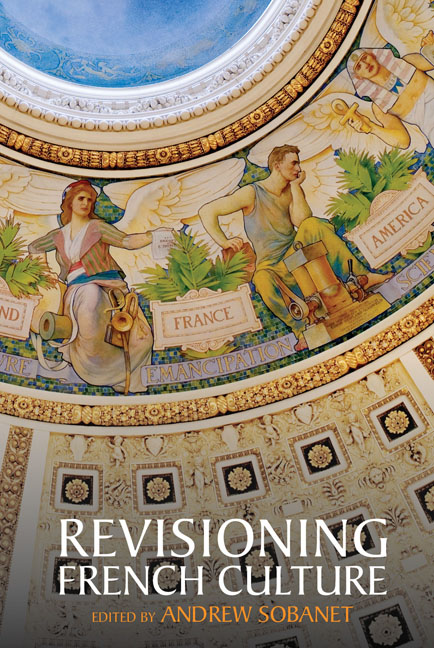Book contents
- Frontmatter
- Contents
- Introduction
- I France in Perspective: The Hexagon, Francophonie, Europe
- II Visions of the World Wars, or L’Histoire avec sa grande hache
- III Refractions and Reflections
- IV French Literature, Revisioned
- V The Subject in Focus
- VI Philosophical Lenses
- VII Coda
- Contributors
- Acknowledgments
- Index
25 - To Larry Kritzman
- Frontmatter
- Contents
- Introduction
- I France in Perspective: The Hexagon, Francophonie, Europe
- II Visions of the World Wars, or L’Histoire avec sa grande hache
- III Refractions and Reflections
- IV French Literature, Revisioned
- V The Subject in Focus
- VI Philosophical Lenses
- VII Coda
- Contributors
- Acknowledgments
- Index
Summary
Dear Larry,
We met in what appeared to me at the time (and still appears to me) to be the heart of the universal academic world: Columbia University and its press. There, you represented French literature of the Renaissance: its rhetoric, its sexuality, the fabulous imagination of Sceve, Ronsard, Rabelais, the Grands Rhétoriqueurs, and, above all, Montaigne. As for me, I embodied ‘the foreigner,’ by way of ‘French Theory’ cloaked in the mystery of Eastern Europe, which was at that time still closed off by the Berlin Wall. Very quickly we perceived that we were at the periphery of this heart: fascinating marginal characters who, at best, destabilized conventional academicism, when we weren’t raising the hackles of the new, politically correct, conformists. Our mutual affinity was immediate and lasting.
Not only because ‘theory,’ as I understand it, with its ingredients of psychoanalytic research and the turbulence of modern and contemporary literature, attempts to locate and work within present renaissances in the discourses of men and women; or because the sixteenth century that you love so well opened paths to the new Self, to the exquisite signifier and to indeterminate sexuality, as refined in pleasures as it was in vanities. So many pathways for our conversations at the Closerie des Lilas in Paris, and in bistros whose names changed with the passing of the years on Amsterdam Avenue or on Broadway in New York. But also because life does not spare the exploring nomads that we are. The sudden death of Jeremy, the fragility of David, the fervor of Philippe, the anguish of Janie, our frustrations or our breakthroughs beneath our apparent integrations into the milieus where we ‘earned our living’— these weave the framework of a reality that resists hyper-connected transparence, resists the rapidity of automated thinking, further and further reduced to a business model, including in the humanities (or what is left of them), and which threatens to extinguish them. We did not ‘communicate’ this resilient intimacy; it is not the sort of thing one can exchange. I insist on inscribing it here, in this letter I address to you, for the collection that your friends have dedicated to you, because our subdued complicity colors our professional engagements and lends to them a certain weight (should I call it metaphysical?), but also an indestructible lightness in the gravest sense.
- Type
- Chapter
- Information
- Revisioning French Culture , pp. 349 - 352Publisher: Liverpool University PressPrint publication year: 2019

